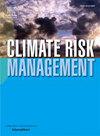气候和天气服务可以增强埃塞俄比亚农民对气候变化的适应能力:全经济影响分析
IF 5
2区 环境科学与生态学
Q1 ENVIRONMENTAL SCIENCES
引用次数: 0
摘要
天气和气候服务在撒哈拉以南非洲尤为重要,在那里,依赖天气的农业是主要的生计来源,而不稳定的天气模式和极端天气事件对农村生计和粮食安全产生重大影响。然而,尽管它们很重要,但它们对农业部门和整体经济的影响还没有得到很好的理解。对于埃塞俄比亚的情况,我们使用可计算的一般均衡建模方法和最新的埃塞俄比亚社会会计矩阵数据来估计WCS对宏观经济变量的潜在贡献,包括国家和部门的国内生产总值增长。该分析纳入了对埃塞俄比亚五个主要地区的住户调查数据进行的单独计量经济学分析的结果,该分析表明,WCS的使用与农业生产率的提高有关。我们估计,与WCS相关的农业生产率提高对总体经济增长的贡献超过6%,对农民应对气候变率和变化的能力可能产生积极影响。WCS对农业生产力的积极影响会传播到整个经济,对GDP的显著积极影响就是明证,尤其是对农业等对气候更敏感的部门。本文章由计算机程序翻译,如有差异,请以英文原文为准。
Climate and weather services can enhance Ethiopian farmers’ resilience to climate change: Economy-wide impact analysis
Weather and climate services (WCS) are particularly important in Sub-Saharan Africa, where weather-dependent agriculture is the main source of livelihood, and where erratic weather patterns and extreme weather events have major impacts on rural livelihoods and food security. However, despite their importance, their effects on the agriculture sector and the overall economy are not well understood. For the case of Ethiopia, we use a computable general equilibrium modeling approach with the latest Ethiopian social accounting matrix data to estimate the potential contribution of WCS to macroeconomic variables, including growth in gross domestic product nationally and by sector. The analysis incorporates results of a separate econometric analysis of household survey data from five major regions in Ethiopia, which showed WCS use is associated with increased agricultural productivity. We estimate that increased agricultural productivity associated with WCS contributes to overall economic growth of more than 6 %, with a likely positive effect on farmers’ resilience to climate variability and change. The positive impact of WCS on agricultural productivity propagate to the overall economy, as evidenced by the considerable positive effect on GDP especially from the more climate sensitive sectors such as agriculture.
求助全文
通过发布文献求助,成功后即可免费获取论文全文。
去求助
来源期刊

Climate Risk Management
Earth and Planetary Sciences-Atmospheric Science
CiteScore
8.20
自引率
4.50%
发文量
76
审稿时长
30 weeks
期刊介绍:
Climate Risk Management publishes original scientific contributions, state-of-the-art reviews and reports of practical experience on the use of knowledge and information regarding the consequences of climate variability and climate change in decision and policy making on climate change responses from the near- to long-term.
The concept of climate risk management refers to activities and methods that are used by individuals, organizations, and institutions to facilitate climate-resilient decision-making. Its objective is to promote sustainable development by maximizing the beneficial impacts of climate change responses and minimizing negative impacts across the full spectrum of geographies and sectors that are potentially affected by the changing climate.
 求助内容:
求助内容: 应助结果提醒方式:
应助结果提醒方式:


